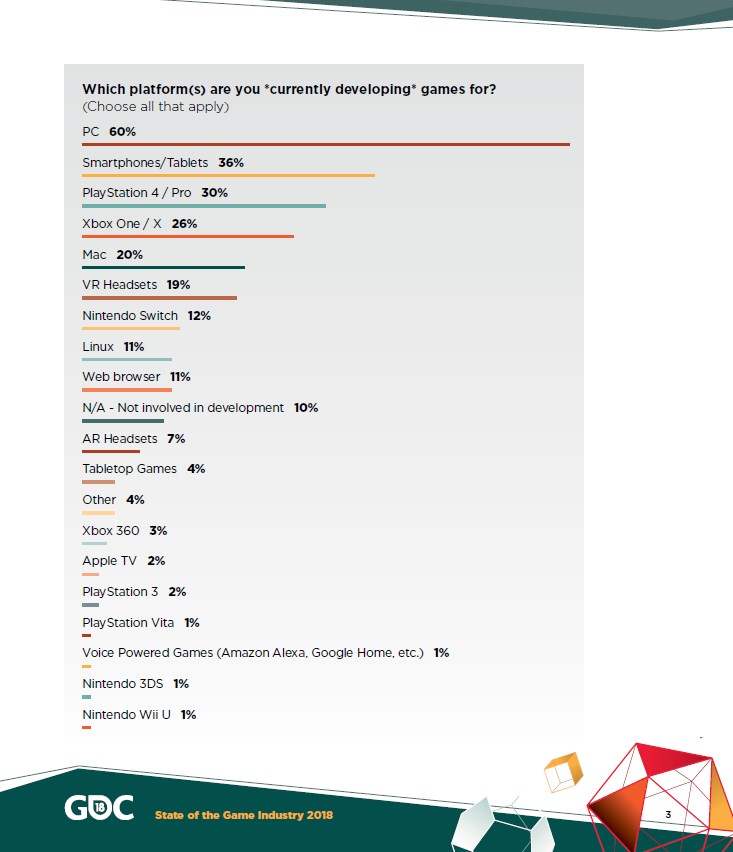Loot boxes aren't going away, GDC survey says
Developers say the industry needs to figure out how to make them work, because studios need them to survive.

The backlash against loot boxes was strong in 2017, but the results of a Game Developers Conference survey of more than 4500 developers who have attended a GDC event in the past three years strongly suggests that they're not going away anytime soon. 11 percent of developers who responded to the survey said they are currently working on a game that will monetize via the sale of "paid item crates," and some developers say they're necessary to ensure the continued stability of the industry.
Loot boxes are also an integral part of videogame markets outside of North America and Europe, another noted, particularly in China and Japan—which also have laws aimed at protecting consumers from abuse. That reflects the real issue, one developer said, which isn't the loot boxes themselves but how they're implemented.
"Time is money," another respondent wrote in follow-up comments. "So long as, A, the content is also accessible by playing the game; and, B, this and all parts of the game are balanced for gameplay first and monetization second, then I see no legitimate basis for complaints."
It's necessary for game makers to figure out how to incorporate loot boxes in a way that works for Western audiences, another developer said, because straight-up game sales are often not enough to enable the development of games that people want to play. That, in turn, could have a detrimental effect on the industry as a whole.
"Microtransactions have to be a part of your strategy in triple-A gaming. So everyone will need to figure out what works for them," they wrote. "I'm sad [Star Wars] Battlefront [2] got it so wrong. This whole controversy will have a lasting impact on the industry and I am most worried it will affect game creators' jobs more than anything."
The GDC 2018 survey also indicates that interest in crowdfunding continues to wane—nearly half of the developers who responded said they had no interest in it—and confidence in the long-term viability of VR and AR is slipping as well, although the majority of respondents still see VR/AR development as sustainable over the long run. The ubiquity of smartphones has driven greater developer interest in AR, while VR hardware and space requirements remain prohibitive for the majority of the potential market.
Interestingly, the report also noted that while PC and mobile are still the top two most popular development platforms, the PC is growing in popularity but smartphones and tablets are slipping. "Last year, 45 percent of respondents said their last game was released for PC/Mac, 35 percent said smartphone/tablet, 19 percent said PS4/PSR Pro, and 15 percent said Xbox One," the survey says.
The biggest gaming news, reviews and hardware deals
Keep up to date with the most important stories and the best deals, as picked by the PC Gamer team.
"So what is everyone work on right now? When asked what platforms they're currently making games for, the majority of respondents (60 percent!) said PC, 36 percent said smartphones/tablets, 30 percent said PlayStation 4/PlayStation 4 Pro, and 26 percent said Xbox One/Xbox One X."
The 2018 Game Developers Conference will run from March 19-23 in San Francisco, California. Details are available at gdconf.com.


Andy has been gaming on PCs from the very beginning, starting as a youngster with text adventures and primitive action games on a cassette-based TRS80. From there he graduated to the glory days of Sierra Online adventures and Microprose sims, ran a local BBS, learned how to build PCs, and developed a longstanding love of RPGs, immersive sims, and shooters. He began writing videogame news in 2007 for The Escapist and somehow managed to avoid getting fired until 2014, when he joined the storied ranks of PC Gamer. He covers all aspects of the industry, from new game announcements and patch notes to legal disputes, Twitch beefs, esports, and Henry Cavill. Lots of Henry Cavill.

